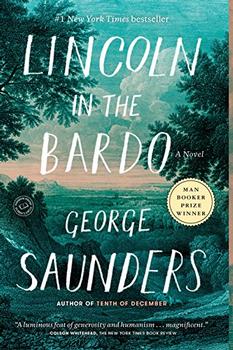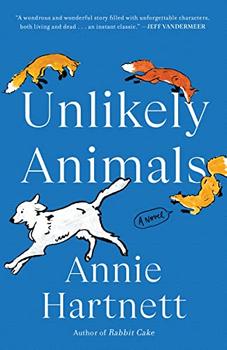Summary | Excerpt | Discuss | Reviews | Beyond the book | Read-Alikes | Genres & Themes | Author Bio

In his long-awaited first novel, American master George Saunders delivers his most original, transcendent, and moving work yet.
Unfolding in a graveyard over the course of a single night, narrated by a dazzling chorus of voices, Lincoln in the Bardo is a literary experience unlike any other - for no one but Saunders could conceive it.
February 1862. The Civil War is less than one year old. The fighting has begun in earnest, and the nation has begun to realize it is in for a long, bloody struggle. Meanwhile, President Lincoln's beloved eleven-year-old son, Willie, lies upstairs in the White House, gravely ill. In a matter of days, despite predictions of a recovery, Willie dies and is laid to rest in a Georgetown cemetery. "My poor boy, he was too good for this earth," the president says at the time. "God has called him home." Newspapers report that a grief-stricken Lincoln returned to the crypt several times alone to hold his boy's body.
From that seed of historical truth, George Saunders spins an unforgettable story of familial love and loss that breaks free of its realistic, historical framework into a thrilling, supernatural realm both hilarious and terrifying. Willie Lincoln finds himself in a strange purgatory, where ghosts mingle, gripe, commiserate, quarrel, and enact bizarre acts of penance. Within this transitional state - called, in the Tibetan tradition, the bardo - a monumental struggle erupts over young Willie's soul.
Lincoln in the Bardo is an astonishing feat of imagination and a bold step forward from one of the most important and influential writers of his generation. Formally daring, generous in spirit, deeply concerned with matters of the heart, it is a testament to fiction's ability to speak honestly and powerfully to the things that really matter to us. Saunders has invented a thrilling new form that deploys a kaleidoscopic, theatrical panorama of voices - living and dead, historical and invented - to ask a timeless, profound question: How do we live and love when we know that everything we love must end?
It's too soon to say if the book had a life-changing impact on me, but it certainly transformed my outlook in the near term. I've been encouraged to look at those around me with more compassion and to appreciate all the tiny, everyday miracles that make up a life—to notice more and to look at the world with renewed wonder. Lincoln in the Bardo is a book I desperately want to share with others, and I can think of no higher recommendation; it's literally unforgettable...continued
Full Review
 (996 words)
(996 words)
(Reviewed by Kim Kovacs).
The word bardo comes from the Tibetan Buddhist tradition and means "in-between." It refers to a transitional state when one's awareness of the physical world is suspended. According to Spiritualtravel.org the concept is an "umbrella term which includes the transitional states of birth, death, dream, transmigration or afterlife, meditation, and spiritual luminosity...for the dying individual, the bardo is the period of the afterlife that lies in between two different incarnations." Most of the characters in Lincoln in the Bardo are in this latter state throughout the novel, stuck between life and whatever awaits them beyond.
Broadly speaking, Buddhist philosophy states that while a person's physical body may die, one's essence does not, ...

If you liked Lincoln in the Bardo, try these:

by Anne Michaels
Published 2025
A breathtaking and ineffable new novel from the author of the international best sellers Fugitive Pieces and The Winter Vault—a novel of love and loyalty across generations, at once sweeping and intimate

by Annie Hartnett
Published 2023
A lost young woman returns to small-town New Hampshire under the strangest of circumstances in this one-of-a-kind novel of life, death, and whatever comes after from the acclaimed author of Rabbit Cake.